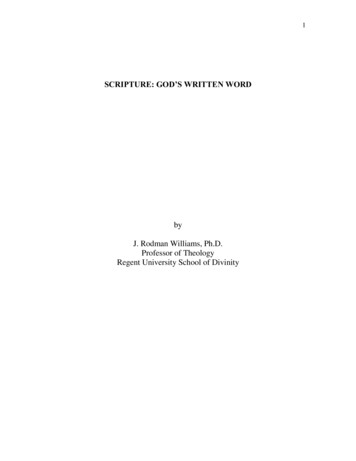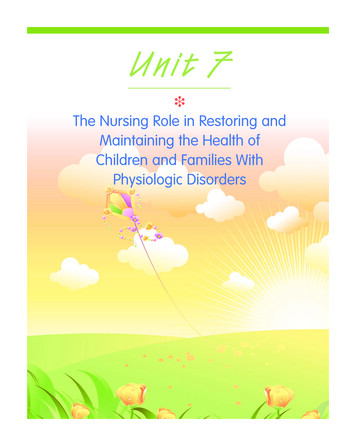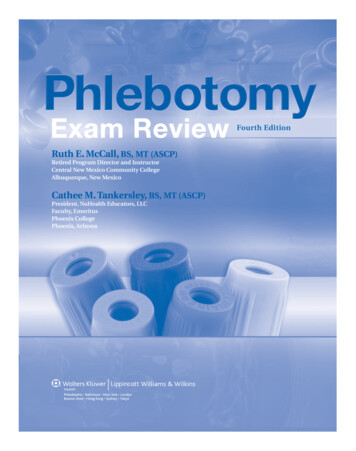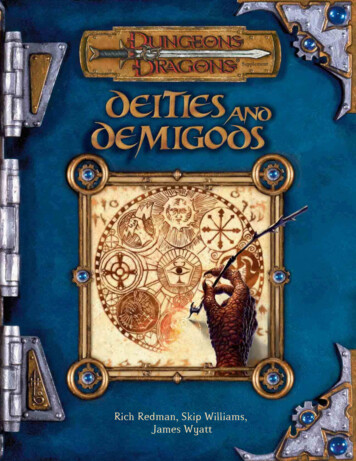
Transcription
1SCRIPTURE: GOD’S WRITTEN WORDbyJ. Rodman Williams, Ph.D.Professor of TheologyRegent University School of Divinity
2Chapter 1Background: God’s Spoken Word and the Role of ScriptureA. God’s Spoken WordIt is important to recognize that the word of God is first of all the word God speaks.God communicates: His word goes forth. God speaks in manifold ways. Let us note whereand how this happens.God speaks His word in and through creation. ―The heavens are telling the glory ofGod. Day to day pours forth speech, and night to night declares knowledge‖ (Psalm19:1-2).1 The Psalmist elsewhere says, ―For ever, O Lord, thy word is firmly fixed in theheavens" (Psalm 119:89). The word God speaks in the heavens is a silent word: ―There isno speech, nor are there words. yet their voice goes out through all the earth, and theirwords to the end of the world‖ (Psalm 19:3-4). God continually speaks in and throughHis creation proclaiming His glory.God speaks His word in and through His prophets and apostles. Itsometimes came to them in a vision, sometimes in a dream, sometimes mouth tomouth‖2 –but in any event it was the word of God spoken to them. Quite frequentin the Old Testament is some such expression as ―The word of the LORD that cameto saying.‖3 That word, in turn, was communicated to others. In the NewTestament the apostles not only on occasion had visions and dreams wherein Godspoke,4 but also they belonged to the immediate circle that heard the word of Goddirectly through Jesus Christ and thereby declared to others that word.God speaks His word in and through His Son. ―In many and various ways Godspoke of old to our fathers by the prophets; but in these last days he has spoken to us by aSon‖ (Hebrews 1:1). Jesus Himself is the Word of God (John 1:1), and in His person,1Revised Standard Version (RSV). This translation will be used throughout unless otherwise noted.E.g., Numbers 12:6-8—―Hear my words: If there is a prophet among you, I the LORD make myselfknown to him in a vision, I speak with him in a dream. Not so with my servant Moses With him I speakmouth to mouth.‖3See, e.g., the opening statement in Jonah and Zechariah. Also note Jeremiah 1:4.4See, e.g., Acts 9:3-9; 16:9-10.2
3words, and deeds communicates the message of God to all mankind. Jesus Christ, in theclimactic sense, is the spoken word of God.God speaks His word in and through the church. ―Through the church themanifold wisdom of God. [is to be] made known.‖ (Ephesians 3:10). The word ofGod thus is also the word proclaimed by the church. Peter speaks of ―the living andabiding word of God‖ and adds that ―the word is the good news which was preachedto you‖ (I Peter 1:23, 25). So Paul can say to Timothy: ―Preach the word‖ (IITimothy 4:2). The preaching of good news, therefore, is the preaching of the wordof God.God speaks His word in the heart of the believer. Moses in making referenceto God‘s commandment says: ―the word is very near you; it is in your mouth and inyour heart, so that you can do it‖ (Deuteronomy 30:14). If this was true of the OldTestament believers, how much more of the Christian believer. For within him is the―implanted word‖ (James 1:21), the word that God speaks: it is living and growing.The continuing challenge was spoken by Paul: ―Let the word of Christ dwell inyou richly, as you teach and admonish one another in all wisdom‖ (Colossians 3:16).Ever and again God speaks His word within the believer who is open to what Godhas to say.Thus in many ways—in creation, prophets and apostles, Jesus Christ, thechurch, the believer—God speaks His word. The word of God thereby is the spokenword of God.B. The Role of ScriptureFrom what has been said, it is apparent that the word of God is not simply identicalwith the Scriptures. The word of God in creation, the incarnate Word of God, theproclaimed word by the church: none is directly Scripture. Even the word that came to aprophet or an apostle was not, as such, Scripture—though it became that when set down in
4writing.5 The word ―in the heart‖ may be Scripture, but it also may be an ―implanted‖ or―engrafted‖6 word that is God‘s peculiar word and work in a particular individual.In all of this, however, the Scriptures occupy a crucially important role. First, wemay speak of the indispensability of Scripture. In relation to the word spoken in creation,the Scriptures make for clarification and discrimination. From a purely natural perspectivethere are aspects of creation today in the visible heavens and the earth that do not seem toproclaim God and His glory, but rather randomness, disorder, and evil. Nature does notalways seem benign in the face of upheavals of earth, violent storms, ravages of wildanimals, and the like. The ―glasses‖7 of Scripture are needed to truly apprehend God‘shandiwork in it all, and to accurately hear what God is saying. The Scriptures areindispensable also in that they are the only record available of the word spoken through theprophets and apostles, and incarnated in Jesus Christ. Without Scriptures we would bedependent on oral tradition with all its ambiguities and uncertainties. The Scriptures,further, are indispensable as a guide for the proclamation of the church. Without theoriginal witness, the message preached and taught would soon lose its bearings.Concerning the matter of the word in the heart, unless there is the constant check ofScripture there is danger of confusing God‘s word with one‘s own personal experience.This leads, secondly, to a recognition of the normativity of Scripture. Since theScriptures are the written record of the prophetic, incarnate, and apostolic word—namely,the special revelation8 of God—they are the norm of all Christian faith and practice.Whatever does not measure up to biblical teaching, or departs therefrom, is a foreignintrusion. Scripture thus is ―for reproof, for correction‖ (II Timothy 3:16). It is bothgovernor and standard: governor of true belief and practice and standard by which all isjudged. Everything must be put to the test of Scripture.5Reference here, of course, is made to those prophets and apostles whose writings became Scripture.There were also prophets in the Old Testament, and the apostles and prophets in the New Testament whosurely heard and spoke God‘s word but who left behind no scriptural record.6James 1:21, King James Version (KJV).7John Calvin‘s expression in his famous Institutes of the Christian Religion, Vol. I, Chap. 6, Sect. 1.8The word spoken in creation is a general revelation of God to all mankind, and the word spoken in the heartof the believer is an individual word. But neither of these is the special revelation which God gave throughHis biblical prophets and apostles, and preeminently through His own Son. (The reader is invited to see myRenewal Theology, Vol. I, God, the World, and Redemption, Chap. 2, ―The Knowledge of God,‖ for a fullerdiscussion of general and special revelation.)
5There is always the danger of tradition becoming a second norm, or—worsestill—the primary norm. Such, unfortunately, is the case in Roman Catholicism wheretradition is placed on a plane of equality with the Scripture,9 and as such in time becomesthe dominant factor. Thus growing traditions with little or no recourse to Scripture, suchas papal infallibility, the immaculate conception, and the assumption of Mary, are finallydeclared to be ―revealed dogmas.‖10 Scripture has ceased to be the norm, whatever claimsmay verbally be made about it. But this also happens in any church, often in subtle ways,when a confession or creed is viewed as the standard for the church‘s faith and practice.Thus, for example, unreserved commitment to the creeds of the early church councils or tothe confession of a particular denomination11 is once again—whatever the claims to thecontrary—a way of going beyond the normativity of Scripture. Hence, it is essential thatcreedal and confessional statements, for all their importance,12 remain secondary toScripture.Also there is the danger of lessening the normativity of Scripture by givingacceptance to later supposed revelations that actually contravene or supplement the specialrevelation in the Bible. In a quite radical fashion this occurs, for example, in the Muslimreligion (Islam) where a presumed additional revelation from God (Allah) is given that,despite frequent reference to the Scriptures of Old and New Testaments, becomes the finalauthority: it is no longer a matter of what the Bible teaches but what the Koran says. Of9According to the official statement of Vatican Council II: ―It is not from sacred Scripture alone that thechurch draws her certainty about everything which has been revealed. Therefore both sacred tradition andsacred scripture are to be accepted and venerated with the same sense of devotion and reverence‖ (TheDogmatic Constitution on Divine Revelation, Chap. 2, Sect. 9).10E.g., The Dogma of the Assumption of the Virgin Mary was so declared in 1950 by Pope Pius XII: ―By theauthority of our Lord Jesus Christ, of the Blessed Apostles Peter and Paul, and by Our own authority, wepronounce, declare, and define it to be a divinely revealed dogma: that the Immaculate Mother of God, theever Virgin Mary, having completed the course of her earthly life, was assumed body and soul into heavenlyglory.‖11An illustration of this is to be found in one of the ordination questions of the Evangelical PresbyterianChurch: ―Do you sincerely receive and adopt the Westminster Confession of Faith and the Catechisms ofthis Church, as containing the system of doctrine taught in the Holy Scriptures?‖ If such church statementscontain ―the system of doctrine,‖ they are likely to become the norm above Scripture.12There is no intention here to deny the importance of doctrinal statements, or even of subscription thereto.―The Bible is our creed‖ sounds superficially good, but the Bible as such is not a creed, or even a confession.Consequently there may be good reason to draw up a statement of faith to declare a church‘s stance.However, when the claim is thereafter made, in some way or other, that such a statement is the truth of theBible, Scripture‘s normativity has been transgressed. The only proper way to go is to recognize that anydoctrinal formulation, whether of creed or confession, must always be subordinate to Scripture and is subject
6course, in the case of the Muslim religion there is no pretense of being or remainingChristian. A less radical example is that of Mormonism which claims to be Christian but,like Islam, has an additional sacred book, The Book of Mormon,13 that is held to have beengiven by revelation. Thus the Bible becomes only a part of revealed truth; and, by virtue ofThe Book of Mormon being more recent, the normativity of Scripture is totally eclipsed.This may also happen within recognized Christian bodies wherever there are claimsto revelation that go beyond Scripture or purport to be authoritative interpretations ofScripture. An example of this is a book on angels wherein ―direct messages‖ interpretingScripture were presumably given by angels, and the claim made that ―part of the specialwork of God is doing is a broader revelation of Himself through messages by angelicvisitation.‖14 A ―broader revelation‖—whatever the claims to the primacy of Scripture,or that such revelation is only a fuller understanding of Scripture—is actually goingbeyond Scripture. If an angel speaks, his message surely must be the norm by whichScripture is to be interpreted!Another, often more subtle, danger is that of allowing cultural conditioning tobecome the norm of truth rather than Scripture. For example, the present day concern onthe part of many for self-realization, or self-achievement, has frequently led to viewingthe Gospel as the guide to that end. The Bible becomes practically a handbook to achievingthe self-fulfilled life. Under such cultural conditioning the message of Jesus aboutself-denial, taking up a cross, and following Him (Matthew 16:24; Mark 8:34; Luke 9:23)is not only translated into a contemporary key but it is transformed15 into somethingentirely different by the cultural setting. The Scripture ceases to be normative.Likewise, personal experience, particularly of a striking kind, can lead to adeparture from the rule of Scripture. For example, this occurred at the time of theReformation when some of the ―left-wing‖ Reformers claimed that ―having the Spirit‖ theyto correction thereby. (On this last point, see The Westminster Confession of Faith, Chap. 3, ―ConcerningSynods and Councils.‖)13In addition, The Doctrine and the Covenants and The Pearl of Great Price are acclaimed as authoritative.14Angels on Assignment by Roland Buck (Houston: Hunter Books, 1979), p. 9.15―Translation‖ is always to be desired. Theology needs constantly to present biblical truth in such fashion(e.g., by making use of modern terminology) that it ―gets through.‖ ―Transformation‖ takes theadditional—and unfortunate—step of allowing the culture to re-shape and thereby transform the message.On this, see New Directions in Theology Today by William Hordern (Philadelphia: Westminster Press,1965), Vol. I, Introduction, Chap. VII, ―Theology in Dialogue.‖
7no longer needed the Scripture and its rule. Similarly, various forms of pietism laterexalted feeling in Christian experience so that while the Bible generally was regarded asthe word of God, the actual norm for Christian faith and practice became the inwardexperience. In the twentieth century one form of this has been demonstrated in―existential‖ approaches to the Bible where existentialist analyses of humanexistence—e.g., the individual in his anxiety, search for freedom, desire for authenticexistence, and the like—become the touchstone of Scripture and its interpretation.16We may now, in the third place, speak of the authoritativeness of Scripture.Because of the fact that the Scriptures are both indispensable to the Word of God spoken inmultiple ways (through creation, prophets, Christ, apostles, and church) and are normativefor the special revelation (in prophets, Christ, apostles), they are authoritative for Christianfaith and practice.The authoritativeness resides, for one thing, in that what is spoken through themultiple ways described is given clarification (the word in creation), expression (the wordin prophets, Christ, and apostles), and direction (the word in the church). Hence Scriptures,by virtue of this comprehensive role, occupy the place of authority. Only they can beturned to as the authority for what is declared in and through all these media.Again, authoritativeness inheres in the fact that the Scriptures are records set downby those who were participants in God‘s special revelation. They ring with the authority ofparticipants in this revelation,17 being first-hand witnesses or in close proximity to thosewho were.18 Since the Scriptures occupy such a position, they have an authoritative role.19Finally, the authoritativeness of Scripture is a result of their being a written record.To be sure, the oral word may also have authority and be handed on to others. For16Tillich in his development of an existentialist theology and Bultmann in his attempt at New Testament―de-mythologization‖ are primary examples.17In the Old Testament, for example, whether it be history, prophecy, psalms, or wisdom literature,everything is declared with a vigorous note of authority.18One of the later tests for inclusion of a book in the New Testament canon was apostolic authority. Do thepresumed Scriptures, or a particular Scripture, represent the original apostolic circle?19We are speaking of the Scriptures that make up the canon. By ―canon‖ is meant the list of books in the Oldand New Testaments that are recognized as authoritative. They include 39 books in the Old Testament and27 in the New Testament (Roman Catholicism includes a number of other books known as the Apocrypha inthe Old Testament; however, Protestantism does not recognize the Apocryphal books as canonical [none ofthe Apocryphal books are found in the official Hebrew canon]). The word ―canon‖ means ―rule‖ or―standard,‖ hence the list of 66 authoritative books in the Old and New Testaments.
8example, the Scriptures by no means contain all that Jesus said and did;20 hence, theapostles who were with Him undoubtedly passed on other of His teachings. Indeed,between the first proclamation of the Gospel and the first writing of what came to be NewTestament Scripture, there was at least a generation when the only authority was the oralword or tradition. Paul writes to the Corinthians: ―I commend you because. you maintainthe traditions even as I have delivered them to you‖ (I Corinthians 11:2).Hence theoral word preceded the written word, and doubtless both accompanied and followed it.However (as earlier mentioned), in time the oral word or tradition inevitably becomesuncertain and ambiguous. Thus the importance of Scripture as an authoritative recordincreases with the passage of years.20Cf. John 21:25.
9Chapter 2Evidence of Scripture as God’s Written WordThis leads to the next affirmation, namely, that Scripture is the written word ofGod, or the word of God in writing. As we have observed above, there is, first, the spokenword of God—and we have considered various relations of Scripture to it. Now we moveon to deal with the quite important affirmation that the Scriptures themselves are God‘swritten word.A. The Self-Attestation of ScriptureThe classical verse in this connection is II Timothy 3:16, which begins: ―AllScripture is inspired by God.‖ The word translated as ―inspired‖ means literally―God-breathed.‖21 Thus does Paul claim for the totality of Scripture—―all‖22—animmediate inspiration from God. It is not said that the Scriptures are breathed into, ratherthey are God-breathed; it is not so much ―inspiration‖ but ―spiration.‖ Hence, they are theproduct of God‘s Spirit23—the Holy Spirit. The conclusion: the Scriptures –asGod-breathed—are His written word.We may look again at the words ―all Scripture.‖ What does this include?Undoubtedly, at least the Old Testament scriptures are being referred to. Just prior to thisverse Paul speaks to Timothy about ―how from childhood you have been acquainted withthe sacred writings.‖ (II Timothy 3:15). ―Sacred writings‖ may also be translated as ―holyscriptures,‖24 thus making reference to the Old Testament and possibly certain Christianwritings.25 In any event Paul is claiming for the Old Testament, at least, the status of all21As the New International Version (NIV) translates.The Greek word is pasa, which may also be rendered as ―every‖ with the possible translation, ―EveryScripture inspired by God‖ (see the New American Standard Bible [NASB] margin.). This translation (asin the main text of the New English Bible [NEB]), implying that not all Scriptures are inspired, wouldscarcely seem to be Paul‘s meaning.23―God-breathed‖—theopneustos in the Greek—also means ―God-Spirited.‖24As in KJV and NIV. The Greek is hiera grammata, literally ―sacred letters.‖25Hiera grammata ―is the name for the holy scriptures of the Old Testament in Greek-speaking Judaism‖(Dibelius, as quoted in The Interpreter’s Bible [Nashville: Abingdon, 1952] on this text). The expressionmay also refer to certain ―Christian documents, even Gospels as well as Epistles‖ (ibid.). The context,22
10Scripture as given by immediate inspiration of God. One further Pauline statement may benoted: ―whatever was written in former days was written for our instruction‖ (Romans15:4). ―Whatever,‖ by definition, signifies ―all‖: and in this instance would seem clearlyto point to the whole of the Old Testament.Now, turning specifically to the New Testament, we observe the words in II Peterwhich speak of Paul‘s letters, plus other undesignated writings, as Scripture: ―our belovedbrother Paul wrote to you. in all his letters. There are some things in them hard tounderstand, which the ignorant
Regent University School of Divinity . 2 Chapter 1 Background: God’s Spoken Word and the Role of Scripture A. God’s Spoken Word It is important to recognize that the word of God is first of all the word God speaks. God communicates: His word g











